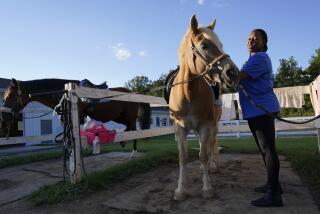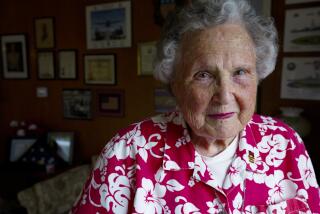When Daddy’s gone for a whole year
Reporting from Crofton, Md. — Looking back, the first sign of trouble was the day Tatum Baugh, 4, refused to come to the phone. Four feet high and 45 pounds, she always held her own against her two brothers in the battle over who got to talk first when Marine Staff Sgt. Tyrone Baugh called home from Iraq.
That day, though, she wanted no part of her dad. In the months to follow, she would throw a punch at one of her teachers and scissors at another, distinguish herself as a regular violator on Miss Kerry’s red light/green light disciplinary chart, and get kicked out of two preschools.
It’s been a rough go for a once well-adjusted child whose wish list for a happy life seemed fairly simple: her new bike, macaroni and cheese, shaking hands with Daisy Duck, and her father at home.
With the nation at war for eight years, one of the longest stretches in American history, a generation of military children is growing up with a parent in combat. The effects of wartime separations on children are only beginning to be understood, particularly on the littlest, who cannot comprehend the meaning of “Daddy will be back in six more months.”
“It didn’t feel fair to her why she couldn’t call her daddy,” said Bonnie Baugh, 34, Tatum’s mother. “Mentally, this last year and a half has really affected her. Everything circles back to not being with her dad.”
War demands a price from military families. Sometimes it’s a life, sometimes a limb, sometimes a marriage. But experts are becoming acutely aware that it can also be the well-being of children like Tatum, who was 3½ when her father deployed, and, it was long assumed, too young to notice.
A recent Rand Corp. study commissioned by the National Assn. of Military Families showed that approximately a third of children aged 11 to 17 from military families reported anxiety symptoms — sleeplessness, unexplained fears — double that seen in civilian families.
The youngest are also turning out to be more vulnerable than once thought: Tricare, the military’s health insurance system, reported that mental health visits for children under 5 jumped 73% between 2005 and 2009.
“We would like to think that little kids won’t remember, or won’t notice; we know that’s not accurate,” said Ellen DeVoe, an associate professor of clinical practice at Boston University, who is developing a program to support young children with a parent returning from war. “Even babies and toddlers understand and will miss their parent. They may become withdrawn, they may cling to the parent at home. They don’t yet understand the concept of time.”
Tatum didn’t withdraw. She rebelled.
***
The orders came through and Ty left for Iraq on July 11, 2008 — his son Chris’ 10th birthday. The family held it together until the ride back from the airport, when it sank in that he was gone.
Bonnie had already moved her three children, Chris, Tatum and Tatum’s twin brother Dahntay, from Camp Lejeune in Jacksonville, N.C., here to central Maryland. Like many military wives whose husbands deploy, she wanted to live near family — her parents and sisters. She took a job as a finance clerk at a medical records company, the kids went to school, and they did what Marine families do: They pushed on.
Ty called whenever he could, delighting in the ruckus every time Bonnie announced: “Who wants to talk to Daddy?” When Tatum stopped coming to the phone, he figured she was just being stubborn and would come around. When he came home on leave that spring, appearing unannounced in her preschool classroom, she bolted for his arms, her face beaming, her dark hair blowing straight back she was running so fast.
The two weeks flew by. Another airport goodbye. Just four more months, he told them. Another teary drive home. They all pushed on. But this time, something in Tatum snapped. She was aggressive, clingy, defiant. The calls from school to “come get Tatum” averaged one a month, and Bonnie would leave work early under the disapproving stare of her boss.
Ty came home in one piece last July, just in time for Chris’ 11th birthday. He went back to Camp Lejeune, his family now rooted in Maryland, 350 miles and a six-hour drive away.
Bonnie hated the idea of moving back to Jacksonville — the armpit of the nation, as Ty, 33, called it. It would mean inferior schools, less competitive soccer teams, no family support. Bonnie would have to give up her dream job — before this, managing a Burger King was as far as she ever got — the $37,000 salary, the second car. And what if Ty deployed again in another year?
He took an apartment with a buddy and drove home when he could, rolling in late Friday nights, leaving after bedtime Sunday, fueled on power drinks, reporting bleary-eyed but ready for duty on Monday. Officially, he was home. But it didn’t feel that way to Tatum.
She acted out at school, averaging three “red lights” a week. The private kindergarten (the twins were too young for public school) decided she shouldn’t come back. Bonnie scrambled and found another school. The problems continued. When Tatum took a swing at her teacher, her mother said enough. She arranged for day care in Jacksonville, and told Ty to come get Tatum.
The day Tatum left, she and her mother cried on the couch for 20 minutes. For the next two months, Tatum lived with her father, went to school and was “good as gold.” He wasn’t surprised. “I understand her. She’s a version of me, only smaller, with some of her mother’s stubbornness.” he said. “When we’re together, it just feels right.”
But when Tatum called her mother at bedtime, she cried most nights. Two months later she was back at home, caught between two worlds.
According to the Department of Defense, about 2 million children in the U.S. are growing up in military families; an estimated 200,000 have a parent at war at any given time.
The Pentagon offers programs to help young families, but the strains of this war are unique from wars past. Deployments are longer and more frequent; some families are on their fifth tour. The stress of the mission is greater across the board — there are no noncombat assignments in Afghanistan or Iraq.
Rates of divorce and child abuse have climbed. Even in families that appear to be holding up, there is concern over the consequences of interrupting early parent-child bonds, when the service member is gone for a year, home for a year, then gone again. A single deployment can be half a toddler’s lifetime.
***
A white Subaru purrs to a stop outside the Baughs’ noisy townhouse one recent chilly night, and Tatum races for the door. She recognizes the engine. Her dad is home.
“Put your shoes on!” her mother hollers. Tatum plops onto the floor and pulls on her sneakers. A rumpled dollar bill — which she had tried to bribe her mother with that morning so she wouldn’t have to go to school — falls from her pocket, but she either doesn’t notice or doesn’t care.
Ty walks in and assumes a scarecrow pose as his children rifle the pockets of his sweat shirt, stuffed with miniature candy bars. They haven’t seen him in a month. Tatum attaches herself to his leg. A pot of ham and potato soup is on the stove, but she doesn’t want to eat. She crawls across the dinner table to retrieve her most recent artwork, a stack of crayon drawings, mostly of her father.
The Baughs aren’t complaining. “When you marry a Marine, you know what’s going to happen, especially in time of war,” Bonnie said. “You hope your husband doesn’t have to go, but you know it’s going to happen. The combat pay helps; he reenlisted in Iraq and got $21,000 tax-free. We paid our bills.”
She expected to handle wartime sure-footed. It did not occur to her that one of her children might not.
“He was around, then he was gone, he came back and now he’s hardly there. For much of Tatum’s life that she can remember, there’s no consistency,” Bonnie said.
Tatum, now 5, is in therapy and a new school. When she threw the scissors while cutting out hearts for Valentine’s Day, her teacher understood. Recently, though, the Baughs decided that leaving Maryland would be hard but living apart was harder. They plan to move to Camp Lejeune in July.
“Tatum is so happy. She didn’t want to go to Jacksonville again without me,” Bonnie said, relieved the decision is finally made, reconciled to its costs.
The best part is soon they will all be together, every night. At least until the next deployment, unscheduled, but not unexpected.
More to Read
Sign up for Essential California
The most important California stories and recommendations in your inbox every morning.
You may occasionally receive promotional content from the Los Angeles Times.










